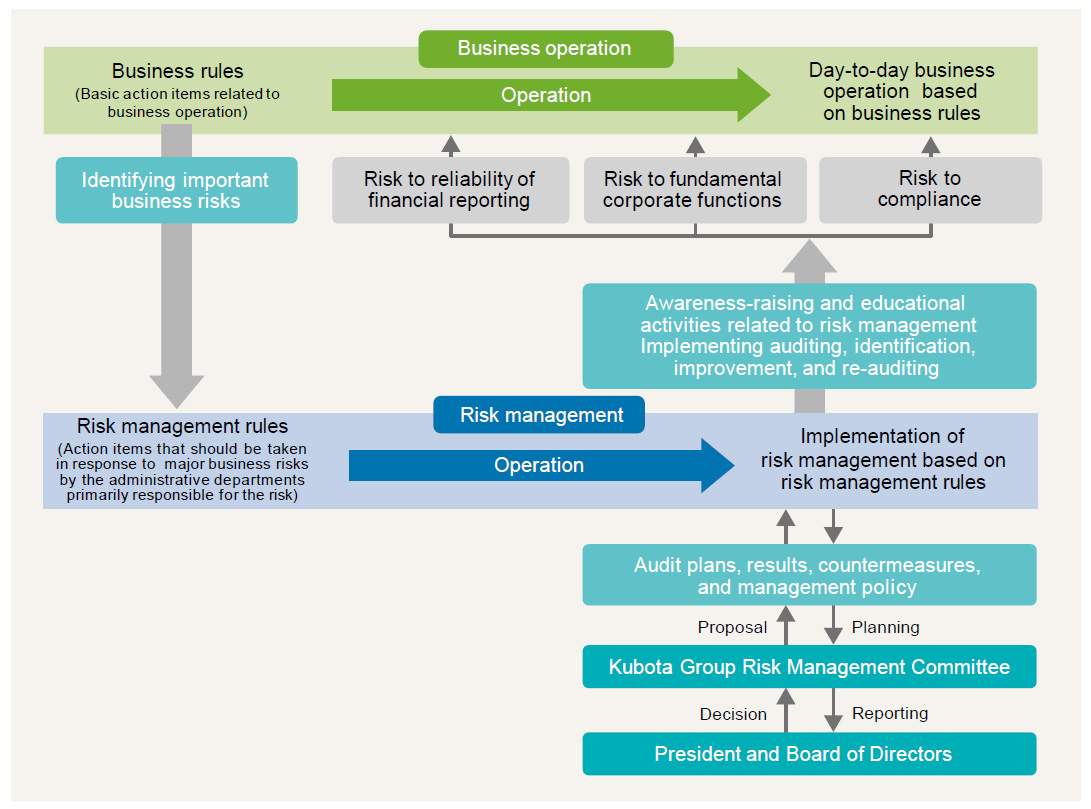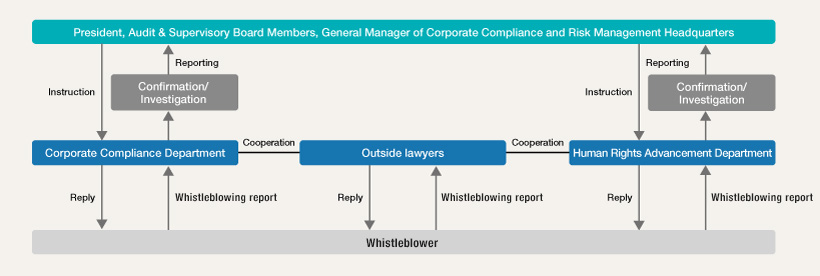Internal Control System
For Kubota Group, its internal control system serves as the mechanism for clearly providing the rules that should be abided by as to the performance of business, and for checking whether or not business has been managed according to those rules. This system consists of the business operation on one hand, which entails the performance of business based on rules, and risk management on the other hand, which entails the management of major business risks.
"Business operation" refers to the notion that basic action items necessary for operating businesses should be set out as “business rules.” The notion also requires that each department should conduct its day-to-day checks in accordance with the “business rules.” “Business rules” consists of general business rules (basic rules) on one hand and functional business rules on the other.
Risk management refers to the notion that “risk management rules” should set out appropriate operational action items that all administrative departments should implement, to the extent that the administrative departments are primarily responsible for some risks. The notion also requires that those departments should identify promotional action items to manage the risks. The notion further requires that auditing should be conducted on appropriate business departments to verify the effectiveness thereof.
In the internal control system, major risks in Kubota’s business are classified into the following three categories:
- Internal control over reliability of financial reporting
- Internal control over the fundamental functions of the company, such as fair trade, environmental conservation, and health and safety
- Internal control over compliance, such as compliance with laws and regulations related to equipment, and import and export control
To avoid those risks, the Kubota Group is building an internal control system based on the COSO framework. Administrative departments primarily responsible for some risks should implement promotional action items and conduct audits on the appropriate business departments. The outcomes of implementation and auditing should be reported to the President and the Board of Directors, together with the action items for the next fiscal year. Thus, the PDCA cycle for risk management is implemented in the manner outlined above.
Internal Control System Overview
Internal Control System Operation Activities (Risk Management Activities)
Kubota considers its risk management activities as part of its business activities. Based on its understanding that risk management is the foundation of business activities, Kubota is willing to exert its efforts to manage risks appropriately through continuous steady improvement via “immediate corrective actions upon any perception of inadequacies,” by identifying risks common to the entire Kubota Group, such as those relating to the reliability of financial reporting. At the same time, while accelerating the global development of its businesses, Kubota strongly recognizes that risk management activities are the foundation for the continuity of its businesses, and strives to improve such activities both in Japan and overseas.
Number of Audits and Contents of Risk Management
| Risk management items | Risk to be avoided |
Number of audited items for FY2024*1 | |
|---|---|---|---|
| Internal control over reliability of financial reporting |
Financial reporting | · Risk to reliability of financial reporting | 7,597 |
| Internal control over the fundamental functions of the company |
Fair trade | · Bid-rigging and price fixing · Unfair trading concerning trading with distributors, etc. · Non-compliance with the Subcontract Act |
130 |
| Environmental conservation |
· Non-compliance with laws and regulations · Environmental accidents · Past environmental debt |
13,319 | |
| Health and Safety | · Occurrence of serious accidents · Occupational illnesses · Investigations and litigations |
1,471 | |
| Quality assurance | · Occurrence of quality problems detrimental to the Kubota brand, etc. | 581 | |
| Labor management | · Breach of duties of care as to safety of employees · Improper management of working conditions · Improper management of part-time employees, contractors and agency employees · Occurrence of labor problems outside Japan |
4,860 | |
| Information security | · Computer virus infection · Information leakage · Information system failure |
3,531 | |
| Intellectual property | · Infringement of other companies’ intellectual property | 840 | |
| Internal control over compliance |
Compliance with laws and regulations related to equipment |
· Non-compliance with laws and regulations of the Building Standards Act, the Fire Service Act, and the Industrial Safety and Health Act, etc. in connection with assets and facilities owned by Kubota | 640 |
| Earthquake and other disaster response management |
· Important managerial losses including danger to human lives due to earthquakes and other disasters, damage to equipment, and destruction of the information system | 110 | |
| Compliance with the Construction Business Act |
· Non-compliance with the Construction Business Act | 496 | |
| Human rights advancement*2 |
· Occurrence of human rights violation issues | - | |
| Safe driving management |
· Accidents arising from non-compliance with traffic laws and regulations and violating acts | 143 | |
| Prevention of illegal payments |
· Trading with antisocial forces · Non-compliance with the Political Funds Control Act · Making inappropriate payments to overseas public servants |
18 | |
| Classified information management |
· The leakage of classified information including a development plan for a new product and sales plan | 419 | |
| Protection of personal information |
· Leakage and loss of personal information related to customers, employees, etc. · Improper use of personal information |
157 | |
| Import and export control |
· Non-compliance with laws and regulations related to importing and exporting, including the Customs Act, the Foreign Exchange and Foreign Trade Control Law, the Basel Convention, and laws related to chemical substances | 73 | |
| Compliance with laws and regulations related to logistics |
· Non-compliance with the three major road laws, including the Road Traffic Act; and with the laws and regulations related to logistics activities, including the Labor Standards Act, etc. | 280 | |
- *1.Number of audited items is the sum of the number of items audited in each of the divisions subject to audit.
- *2.Activities for human rights advancement focused mainly on training, the release of information, and the follow-up of survey results.
Whistleblowing System
Contact Points for Kubota and Domestic Group Companies (Kubota Hotline)
As a framework to supplement risk management, the Kubota Group has established the Kubota Hotline as a contact point for Kubota and its domestic Group companies. It aims to prevent, or quickly detect and correct, any illegal or unethical acts, as well as to develop an open corporate culture. Aside from the Kubota Hotline, in Japan, Kubota also operates an Audit & Supervisory Board member hotline for the reporting of matters relating to Kubota directors and a Kubota Group Supplier Hotline for our outside business partners.
Types of issues and departments responsible for handling the reports
- Addresses issues in general related to corporate ethics, such as legal violations, internal regulation breaches, corrupt practices, human rights violations, and harassment.
- Reports will be handled in cooperation with the Corporate Compliance Department, the Human Rights Advancement Department, and external lawyers.
Available to
- All the employees at Kubota and its domestic Group companies (including retiree within one year)
- Anonymous reporting and consultations are also accepted
Reporting method
- Kubota Hotline accepts consultations via a dedicated form available 24/7, telephone, or email.
Protection of whistleblower
- The internal regulations of Kubota and its domestic Group companies clearly state that whistleblowers and other users of the hotline must not be treated unfavorably.
- Personnel responsible for handling reports and consultations at each location are required to sign a written oath regarding the confidentiality of information.
Raising awareness of Kubota Hotline
Kubota Hotline has been disseminated through multiple channels including the intranet. In order to alleviate any concerns that may arise from a lack of understanding of the Kubota Hotline, information on the protection of the whistleblower, handling of anonymous reports, and process of using Kubota Hotline.
Reporting to executive management
Information on the number and the content of reports is regularly presented to executive management to provide an overview of risk and enable measures to prevent recurrence..
Reports made to the hotline (in Japan)
| FY2022 | FY2023 | FY2024 |
|---|---|---|
| 100 | 118 | 144 |
of which, 75% were labor and personnel related.
Flowchart of Kubota Hotline
Contact Points for Overseas Group Companies (Global Hotline)
Kubota Group Global Hotline has been implemented at some overseas locations since 2023. The Global Hotline is for the reporting of risk* that have a significant impact on the management of Kubota Group.
- Anonymous reporting is available
- The Global Hotline is available 24/7 from PC or smartphone
- The website supports 16 languages, and the telephone line supports over 200 languages
- Investigations and other forms of response are conducted in collaboration with law firms when necessary
- Bribery, violation of competition laws, leakage of sensitive information, including personal data, and misconduct by executive management

